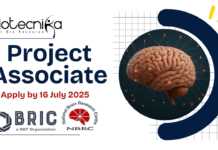--Must See--
Genomic Bioinformatician Job Description – At QTLomics Technologies (P) Ltd.
Education:
- MSc (with 2 to 3 years of experience) or PhD in Bioinformatics (with 1 to 2 years) with a specialization in bioinformatics, genomics, or data science with a biology focus.
Professional Experience and Technical Proficiency:
- Experience in developing and applying computational tools and algorithms to analyze, manage, and interpret large biological datasets.
- Write reports and publications summarizing findings and present them to the scientific community. Must have excellent writing skills and be able to communicate findings clearly and concisely.
- Stay up to date with new developments and technologies by attending conferences or reading scientific journals to stay current with the latest research.
Biological and Technical Skills
- Molecular Biology Basics
- DNA and RNA structure, function, and properties.
- Understanding of gene expression and regulatory mechanisms.
- Plant Genetics Knowledge
- Familiarity with plant-specific genomic features, such as polyploidy, chloroplast and mitochondrial DNA, and transposable elements.
- Basic knowledge of plant breeding, evolution, and adaptation.
- Whole Genome Analysis
- Sequence Data Processing: Quality control of raw sequence data (e.g., using tools like FastQC). Trimming and filtering low-quality reads.
- Sequence Alignment: Proficiency in alignment tools like BWA, HISAT2, and STAR. Understanding sequence mapping against reference genomes.
- Annotation and Functional Analysis : Using tools like BLAST, InterPro, and functional annotation pipelines. Identifying coding and non-coding RNAs.
- De Novo Assembly: Assembly of genomes or transcriptomes for plants without a reference genome (using tools like Trinity, SPAdes).
- Variant Calling and Analysis: SNP, InDel, and structural variant detection using GATK, SAMtools, or other variant analysis pipelines.
- Expression Analysis: Normalization and differential expression analysis using tools like DESeq2, EdgeR, or Cufflinks.
- Pathway and Network Analysis: Tools for pathway enrichment (e.g., KEGG, GO) and network visualization using Cytoscape.
- Epigenomic Analysis: Understanding methylation patterns and histone modifications in plants. Tools for methylation analysis.
- Transcriptomics
- RNA-Seq protocols and analysis.
- Techniques for identifying and quantifying gene expression.
Bioinformatics Skills
- Sequence Data Processing
- Quality control of raw sequence data (e.g., using tools like FastQC).
- Trimming and filtering low-quality reads.
- Sequence Alignment
- Proficiency in alignment tools like BWA, HISAT2, and STAR.
- Understanding sequence mapping against reference genomes.
- Annotation and Functional Analysis
- Using tools like BLAST, InterPro, and functional annotation pipelines.
- Identifying coding and non-coding RNAs.
- De Novo Assembly
- Assembly of genomes or transcriptomes for plants without a reference genome (using tools like Trinity, SPAdes).
- Variant Calling and Analysis
- SNP, InDel, and structural variant detection using GATK, SAMtools, or other variant analysis pipelines.
- Expression Analysis
- Normalization and differential expression analysis using tools like DESeq2, EdgeR, or Cufflinks.
- Pathway and Network Analysis
- Tools for pathway enrichment (e.g., KEGG, GO).
- Network visualization using Cytoscape.
- Epigenomic Analysis
- Tools for methylation analysis.
Computational and Programming Skills
- Programming Languages: Proficiency in Python, R, or Perl for custom analysis. Shell scripting for pipeline automation.
- Data Visualization: Tools like ggplot2 (R), matplotlib (Python), IGV (Integrative Genomics Viewer), UCSC Genome Browser, or specialized bioinformatics visualization tools.
- Big Data Handling: Experience working with large datasets and high-performance computing environments.
- Database Management: Familiarity with genomic databases like NCBI, EnsemblPlants, or Phytozome.
- Pipeline Development: Workflow management tools like Snakemake or Nextflow.
Gene Insertion Site Evaluation
- Gene Editing Knowledge
- Understanding gene insertion techniques (e.g., CRISPR-Cas9, Agrobacterium-mediated transformation, or biolistics).
- Variant Analysis: Detecting structural variants caused by the insertion using tools like DELLY or LUMPY.
- Integration Site Analysis
- Locating the exact genomic coordinates of the inserted gene.
- Tools: TSDFinder, BEDTools for overlap with genome features.
Analytical and Soft Skills
- Statistical Analysis: Strong grasp of statistics for biological data analysis. Understanding of multiple testing corrections and confidence intervals.
- Critical Thinking: Ability to interpret results biologically and statistically.
- Problem-Solving: Troubleshooting experimental and computational workflows.
- Collaboration and Communication: Working with multidisciplinary teams and presenting complex results effectively to a non-specialist audience.
How to Apply: Kindly send your CV’s to the following email ID: [email protected]
Editor’s Note: Genomic Bioinformatician Job at QTLomics Technologies (P) Ltd. Genomic Bioinformatician Job. Please ensure you are subscribed to the Biotecnika Times Newsletter and our YouTube channel to be notified of the latest industry news. Follow us on social media like Twitter, Telegram, Facebo









































